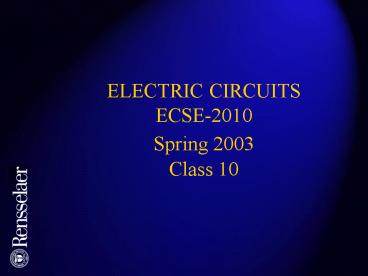ELECTRIC CIRCUITS ECSE2010 Spring 2003 Class 10 - PowerPoint PPT Presentation
1 / 41
Title:
ELECTRIC CIRCUITS ECSE2010 Spring 2003 Class 10
Description:
Will do Computer Project #1 in Class (CP-1) Will spend second hour reviewing ... Will Use Oscilloscope: Tremendous Instrument. Does Great and Wonderful Things ... – PowerPoint PPT presentation
Number of Views:71
Avg rating:3.0/5.0
Title: ELECTRIC CIRCUITS ECSE2010 Spring 2003 Class 10
1
ELECTRIC CIRCUITSECSE-2010Spring 2003 Class 10
2
ASSIGNMENTS DUE
- Today (Tuesday/Wednesday)
- Will do Experiment 4 in Class (EP-4)
- Activity 10-2 (There is no 10-1)
- Thursday
- Experiment 2 Report is Due
- Will do Computer Project 1 in Class (CP-1)
- Will spend second hour reviewing for Exam I
- Next Monday
- Exam I, 7-9, DCC 308
- Homework 4 Due
- Experiment 3 Report Due
- Activities 12-1, 12-2 (In Class)
3
OPEN SHOP HOURS
- Wednesdays
- 9 11 am Prof. Nagy
- 12 2 pm Prof. Millard
- 2 - 4 pm Prof. Jennings
- Thursdays
- 9 - 10 am Prof. Millard
- JEC 4104
4
REVIEW
- Real Operational Amplifiers
- Rin 10 M (Very Large)
- Rout 100 ohms (Very Small)
- Gain A 105 (Very Large)
- vout Can Never be Greater than VDC
- Building Blocks for Electronic Circuits
- Model Real Op Amp with Ideal Op Amp
- Rin Infinite
- Rout 0
- Gain Infinite
- Good Model for Almost All Op Amp Circuits
5
EXAMPLE OF REAL OP AMP
6
REAL OP AMP MODEL
7
Fig. 10.1 The 741 op-amp circuit. Q11, Q12, and
R5 generate a reference bias current, IREF, Q10,
Q9, and Q8 bias the input stage, which is
composed of Q1 to Q7. The second gain stage is
composed f Q16 and Q17 with Q13 acting as active
load. The class AB output stage is formed by Q14
and Q20 with biasing devices Q18 and Q19 and an
input buffer Q23. Transistors Q15, Q21, Q24, and
Q22 serve to protect the amplifier against output
short circuit and are normally off.
8
IDEAL OP AMP
9
REVIEW
- Ideal Op Amps
- ip in 0 Ideal Op Amp draws no current
- vout can never be greater than Vdc
- vout VDC if vp gt vn
- vout - VDC if vp lt vn
- Comparator
- Can Model Most Real Op Amps with Ideal Op Amp
- Actual behavior will only vary slightly
10
REVIEW
- Op Amp with Negative Feedback
- Any circuit connection between vout and vn
- Creates Virtual Short at input to Op Amp
- ip in 0 AND vn vp
- Output can be finite
- Output determined by other circuit elements
- Find Output using Circuit Analysis
- Look at Effects of Real Op Amps Later (usually
using PSpice)
11
IDEAL OP AMP WITH NEGATIVE FEEDBACK
12
REAL OP AMP WITH NEGATIVE FEEDBACK
13
ISOLATION AMPLIFIER
14
NON-INVERTING VOLTAGE AMPLIFIER
15
INVERTING VOLTAGE AMPLIFIER
16
SUMMING AMPLIFIER
17
DIFFERENTIAL AMPLIFIERS
18
ACTIVITY 10-2
19
ACTIVITY 10-2
20
ACTIVITY 10-2
21
ACTIVITY 10-2
22
ACTIVITY 10-2
- Part b) vout in Circuit B
23
ACTIVITY 10-2
24
ACTIVITY 10-2
- Part c) RF KR1 R3 KR2
25
REAL OP AMPS
- On Thursday, we will explore what happens when we
use Real Op Amps rather than Ideal Op Amps - Will start Computer Project 1 where we will use
the Circuit Model for an Op Amp and use finite
Rin, non-zero Rout and finite Gain, A - Will Spend Second Hour Reviewing for Exam I
26
EXPERIMENT 4
- Lets Look at 741 Op Amp Circuit
- 741 is a Very Common Op Amp Cheap, Good
- Will Build a Non-Inverting Voltage Amplifier
- Gain 2
- Must Provide 5 V, - 5 V to Amplifier
- Use E3631A Power Supply
- Use 25 V, Common to get 5 V
- Use - 25 V, Common to get - 5 V
- Adjust Separately
- Remember this! We will use it often
27
EXPERIMENT 4, PARTS 1 2
28
EXPERIMENT 4
- Will Use Oscilloscope
- Tremendous Instrument
- Does Great and Wonderful Things
- Make Sure Probe Attenuation Factor 1
- Learn to Use the Functions
- Will Use Function Generator
- Rs for FG 50 ohms
- Digital Voltage Readout on FG is Always Wrong
when Output is plugged into Scope! - Digital Voltage Readout on FG assumes it is
plugged into something with Req 50 ohms - Always Measure Voltage Output of FG on Scope
29
741 LAYOUT
30
EXPERIMENT 4
31
EXPERIMENT 4
32
EXPERIMENT 4
33
EXPERIMENT 4, PARTS 1 2
34
EXPERIMENT 4, PARTS 3-5
35
EXPERIMENT 4, PARTS 3,4,5
36
EXPERIMENT 4, PART 5
37
EXPERIMENT 4, PART 5
38
EXPERIMENT 4, PART 5
39
EXPERIMENT 4, PART 5
40
EXPERIMENT 4, PART 5
41
EXPERIMENT 4, PART 5































